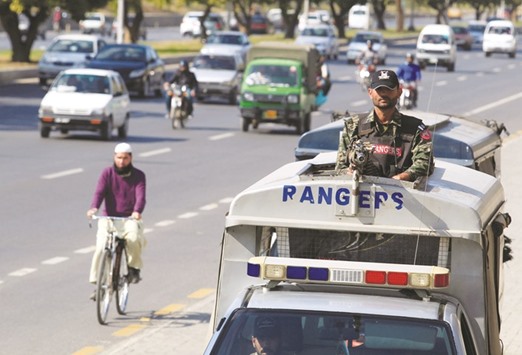Pakistan will seek the help of a paramilitary border-security force to crack down on militants in Punjab province, Prime Minister Nawaz Sharif’s power base, after attacks that killed more than 100 people last week, a government spokesman said yesterday.
On Sunday, days after a suicide bomber killed 13 people in the Punjabi city of Lahore, the provincial government said the security force, called the Rangers, would carry out “indiscriminate action” against all militants and their facilitators.
For the Rangers to conduct a full-scale operation in Punjab would represent the civilian government once again granting special powers to the military to fight Islamist militants.
“Rangers-police joint operations will start in a week or two,” the Punjab government’s spokesman, Malik Mohamed Ahmad, said yesterday.
It was unclear whether the new crackdown would target groups like the Jaish-e-Mohamed and Lashkar-e-Taiba, which are aligned against Pakistan’s arch rival, India.
Critics have accused Pakistan in past crackdowns of sparing militant groups that do not attack on Pakistani soil.
The Pakistani state denies this.
A government statement did not specify which groups would be targeted.
The army’s media wing did not respond to requests for comment.
Rangers have been called in for special security operations in much of the country, but the issue is politically sensitive for Sharif’s home province, where local officials have expressed reluctance.
A crackdown by the Rangers in the port city of Karachi in 2013 drew accusations of rights abuses and the targeting of opposition politicians, though the rate of violence has dropped sharply since.
The Rangers deny any wrongdoing.
A member of the Punjab government’s task force on law and order said Rangers’ help would be sought in counter-terrorism operations but a full-scale paramilitary operation like the one in Karachi was “out of the question.” He declined to be named.
The Punjab government has promised “indiscriminate” action against all militants in the past, including after an Easter Day bombing in Lahore that killed 70 people.
Last month, after years of pressure, Pakistani police arrested Lashkar-e-Taiba chief Hafiz Saeed, accused by the US and India of masterminding the 2008 Mumbai attacks that killed 166 people.
Just days after last week’s Lahore bombing, an attack at a shrine in the southern Sindh province killed 90 people in the country’s deadliest attack in two years, shaking a nascent sense that the worst of Pakistan’s militant violence may be behind it.
The attack was claimed by Middle East-based Islamic State, which has a small but increasingly prominent presence in Pakistan.
In a related development, the Pakistani army killed several militants in aerial bombing carried out on militant hideouts in North Waziristan region of Wucha Bibi.
According to the statement issued by the military, a number of militants were killed in the border area of Wucha Bibi by the Pakistani Air Force aircraft bombing in North Waziristan.
Several hideouts of militants were also destroyed, following reports of the terrorists attempting to re-organise in Wucha Bibi.
Meanwhile, the security forces have moved heavy artillery and other military equipment closer to Afghanistan’s border to counter militants that pose a serious threat to Pakistan.
The Pakistani Army also tightened security at Pak-Afghan border to strictly monitor terrorists movement, Pakistan’s Dunya News reported.

A Pakistani Rangers personnel keeps guard while patrolling on the streets in Islamabad, yesterday.
